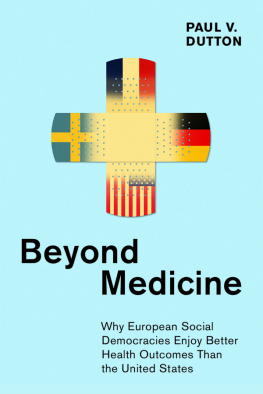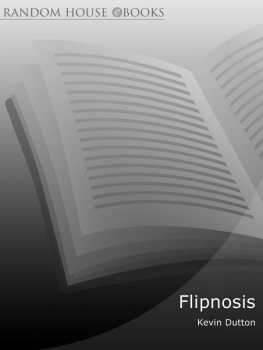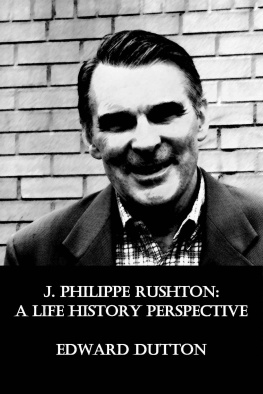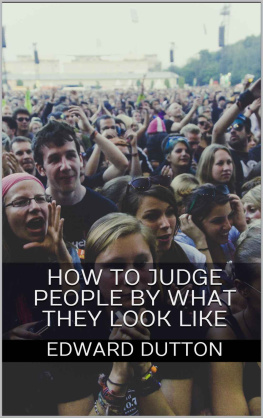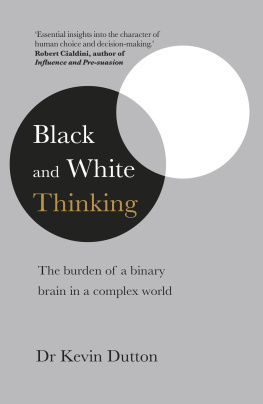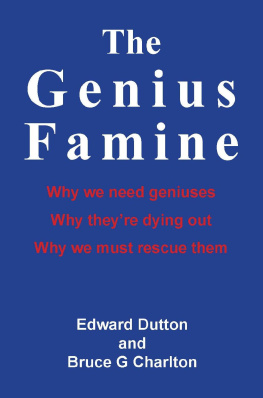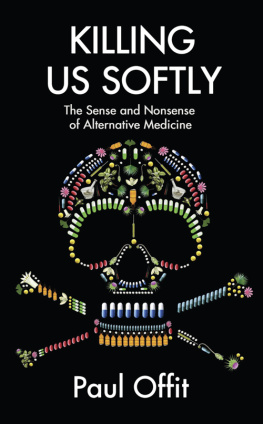Paul V. Dutton - Beyond Medicine
Here you can read online Paul V. Dutton - Beyond Medicine full text of the book (entire story) in english for free. Download pdf and epub, get meaning, cover and reviews about this ebook. year: 2021, publisher: Cornell University Press, genre: Politics. Description of the work, (preface) as well as reviews are available. Best literature library LitArk.com created for fans of good reading and offers a wide selection of genres:
Romance novel
Science fiction
Adventure
Detective
Science
History
Home and family
Prose
Art
Politics
Computer
Non-fiction
Religion
Business
Children
Humor
Choose a favorite category and find really read worthwhile books. Enjoy immersion in the world of imagination, feel the emotions of the characters or learn something new for yourself, make an fascinating discovery.
- Book:Beyond Medicine
- Author:
- Publisher:Cornell University Press
- Genre:
- Year:2021
- Rating:5 / 5
- Favourites:Add to favourites
- Your mark:
- 100
- 1
- 2
- 3
- 4
- 5
Beyond Medicine: summary, description and annotation
We offer to read an annotation, description, summary or preface (depends on what the author of the book "Beyond Medicine" wrote himself). If you haven't found the necessary information about the book — write in the comments, we will try to find it.
Beyond Medicine — read online for free the complete book (whole text) full work
Below is the text of the book, divided by pages. System saving the place of the last page read, allows you to conveniently read the book "Beyond Medicine" online for free, without having to search again every time where you left off. Put a bookmark, and you can go to the page where you finished reading at any time.
Font size:
Interval:
Bookmark:

A volume in the series
The Culture and Politics of Health Care Work
Edited by Suzanne Gordon and Sioban Nelson
For a list of books in the series, visit our website at cornellpress.cornell.edu.
Copyright 2021 by Cornell University
All rights reserved. Except for brief quotations in a review, this book, or parts thereof, must not be reproduced in any form without permission in writing from the publisher. For information, address Cornell University Press, Sage House, 512 East State Street, Ithaca, New York 14850. Visit our website at cornellpress.cornell.edu.
First published 2021 by Cornell University Press
Library of Congress Cataloging-in-Publication Data
Names: Dutton, Paul V., author.
Title: Beyond medicine : why European social democracies enjoy better health outcomes than the United States / Paul V. Dutton.
Description: Ithaca [New York] : Cornell University Press, 2021. | Series: The culture and politics of health care work | Includes bibliographical references and index.
Identifiers: LCCN 2020025549 (print) | LCCN 2020025550 (ebook) | ISBN 9781501754555 (hardcover) | ISBN 9781501754562 (paperback) | ISBN 9781501754586 (pdf) | ISBN 9781501754579 (epub)
Subjects: LCSH: HealthSocial aspectsUnited States. | HealthSocial aspectsEurope, Western. | HealthPolitical aspectsUnited States. | HealthPolitical aspectsEurope, Western. | Medical careUnited StatesHistory. | Medical careEurope, WesternHistory. | Well-beingUnited States. | Well-beingEurope, Western.
Classification: LCC RA418.3.U6 D87 2021 (print) | LCC RA418.3.U6 (ebook) | DDC 362.1dc23
LC record available at https://lccn.loc.gov/2020025549
LC ebook record available at https://lccn.loc.gov/2020025550
To Allan Mitchell,
teacher, mentor, friend
The idea of social democracy is now used to describe a society the economy of which is predominantly capitalist, but where the state acts to regulate the economy in the general interest, provides welfare services outside of it and attempts to alter the distribution of income and wealth in the name of social justice.
Routledge Encyclopedia of Philosophy
This book owes its origins to my experience of founding and directing an interdisciplinary health policy research institute at Northern Arizona University between 2008 and 2015. The institute brought together anthropologists, biologists, health scientists, hospital administrators, insurance executives, medical faculty, physicians, political scientists, psychologists, state legislators, public health officials, social workers, and many others. Amazingly, I never had to recruit any of them. Once word got out that we were working across disciplinary boundaries, dozens of talented people called, wanting to be involved. Every one of them was special. Each intuitively understood that no matter how great their individual achievements, large-scale solutions would require collaboration with others from across the health systemthat health encompasses all dimensions of life and is therefore inescapably interdisciplinary. And that because of our incessant efforts to partition expertise into ever-more specialized fields we are losing sight of the big picture that is imperative to wise policy making.
As the director I had the privilege of participating in many institute projects and events. Two of them were especially formative to this books emphasis on the social determinants of health and the potential for state action to improve them. In 2012, the public health researchers Priscilla Sanderson and Nicky Teufel-Shone won a large, multiyear grant from the National Institutes of Health to create the Center for American Indian Resilience (CAIR). Priscilla asked me to chair the executive advisory board, a group of eminent Native American leaders and health experts. Never before in my life has it been clearer to me that I should listen and that I should talk only when necessary. Native American leaders understand like no one else that health is about community. Unlike some of my other institute meetings where physicians were present, Navajo, Hopi or Tohono Oodham doctors never arrogated for themselves an outsized role in the struggle against serious health conditions. They spoke with expertise about medical matters yet yielded to others on the equal importance of poverty, racism, and the absence of opportunity. I came away from every CAIR board meeting with a deeper appreciation of the social determinants of health and a resolve to bring those understandings to my own research.
The institute also held health policy roundtables for the stakeholders of Arizonas health system. We modeled these annual events on the Aspen Institute Seminar. Participants agreed in advance to ground rules that included confidentiality, empathetic listening, and the objective of finding common ground. By far, the deepest policy division of the time was whether Arizona should expand its Medicaid program under the 2010 Affordable Care Act. With a Republican governor and Republican majorities in control of both houses of the state legislature it seemed unlikely that Arizona would go along with Obamacare. Our roundtables included the states Medicaid director and the governors health policy advisor. Also in attendance were Democratic and Republican state legislators, rural hospital CEOs, insurance executives, large hospital CMOs, physicians, researchers, county health directors, and others; we capped attendance at thirty-two. In facilitating the roundtables, I was surprised to learn that todays health politics resemble those of the nineteenth and early twentieth centuries. Ideological and partisan divides are important, but they are joined by many other concerns. In June 2013, Arizona governor Jan Brewer worked with Democratic lawmakers and a few moderate Republicans to defeat her own partys legislative majorities to expand Arizona Medicaid under the Affordable Care Act. Her action extended health coverage to over three hundred thousand low-income workers and their children. When diverse stakeholders unite, they can influence state power in surprising ways. The following history recounts many such instances in hopes of illuminating the potential for future state action to improve the opportunity for all to live healthy lives.
Paul V. Dutton
Tucson, Arizona
Historians rely on the traces left behind by others. We interpret their actions by connecting them with other people, patterns, and possibilities in order to make sense of the past. Yet this task becomes more difficult the closer we approach the present. We lack too much of the perspective that only the passage of time can provide. For this reason, I owe a tremendous debt to my colleagues in economics, medical sociology, epidemiology, and the health sciences. Their accomplishments made it possible for me to navigate the treacherous straits of the recent past and to emerge into the light of present day. Specialists of all kinds will, no doubt, find omissions in my analysis. This is only natural. I only ask that they bear in mind the breadth of the comparative project at hand. I sometimes had to simplify my language and to condense detail to reach as broad an audience as possible.
Several individuals gave gifts of time and expertise. My editor at Cornell University Press, Suzanne Gordon, supported the project from the beginning, and her professional eye never faltered; she provided constructive criticism right up to the end. Over a long Parisian lunch, Elodie Richard listened carefully as I poured out my confusion over how to organize the unwieldy past of European and American health institutions and outcomes. Then she calmly suggested the comparative approach that follows. I hope I have done justice to her idea. My friend Ray Michalowski provided incisive observations and advice on early drafts. Paul-Andr Rosenthal loaned me his lectern for a day at Sciences Po, Romain Huret did the same at the cole des Hautes tudes en Sciences Sociales, and Bruno Valat invited me to address his research working group at the Universit de Toulouse-Mirail. I am grateful for these opportunities to share my ideas with advanced graduate students and faculty; they contributed immeasurably to this book.
Next pageFont size:
Interval:
Bookmark:
Similar books «Beyond Medicine»
Look at similar books to Beyond Medicine. We have selected literature similar in name and meaning in the hope of providing readers with more options to find new, interesting, not yet read works.
Discussion, reviews of the book Beyond Medicine and just readers' own opinions. Leave your comments, write what you think about the work, its meaning or the main characters. Specify what exactly you liked and what you didn't like, and why you think so.

